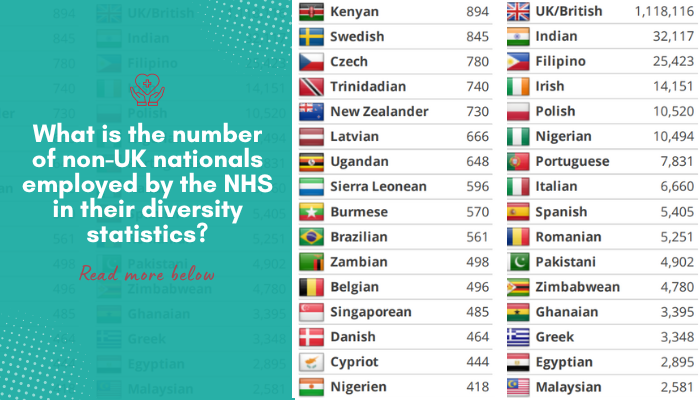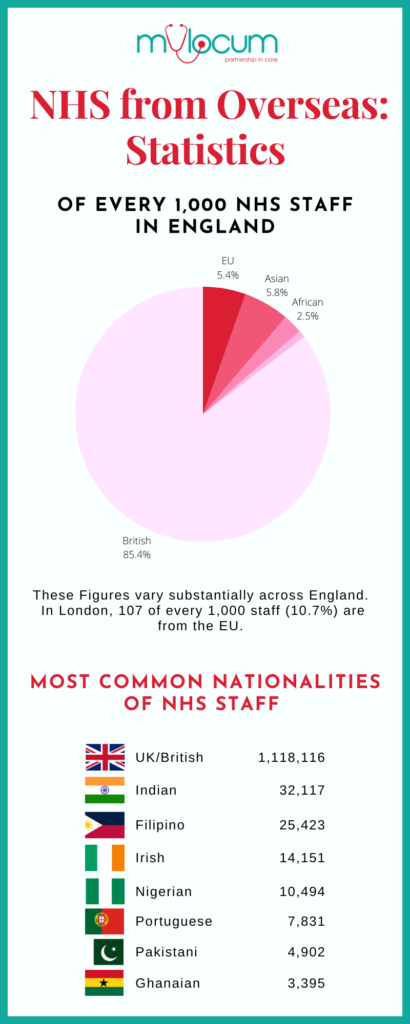
In this article, we’ll show how the NHS embraces diversity with statistics for clarity. Also mentioned how the NHS funding increased for international recruitments in 2019.
How the NHS is open to Diversity
First of all, Nurses, what is diversity about for the NHS? Diversity is all about recognizing and valuing differences through inclusion, regardless of the:
- Age
- Disability
- Gender
- Religion
- Belief
- Commitments outside of work
- Part-time or shift work
- Language
- Perspectives
- Opinions
NHS is committed to providing services and employment to a community with an increasing variety of backgrounds. The NHS must promote equality, embrace diversity, and treat all users, staff, and carers with dignity.
NHS Diversity: Values
The NHS has set 6 values and having these will ensure the best possible care for you and your patients:
-
Working together for patients:
Putting patients first requires engaging with staff, patients, carers, families, communities, and external professionals. They put the needs of patients and communities before organizational boundaries.
-
Respect and dignity:
They value individuals, respect their ambitions and commitments, and seek to understand their priorities, needs, abilities, and limits. To listen and be honest about others’ perspectives, capabilities, and limitations.
-
Commitment to quality of care:
Insisting on quality and getting the basics right every time earns the trust placed in the NHS. That includes safety, confidentiality, integrity, accountability, and communication. NHS is open to feedback so they can learn from their mistakes and build on their success.
-
Compassion:
The NHS responds with humanity and kindness to each patient’s pain, distress, anxiety, or need. They search for the things we can do, also to give comfort and relieve suffering. We prioritise those we serve and work with, proactively showing we care without waiting to be asked.
-
Improving Lives:
They strive to improve health and well-being and people’s experience of the NHS. We value excellence and professionalism in everyday activities that improve people’s lives. As well as in clinical practice, service improvements, and innovation.
-
Everyone counts:
NHS resources should benefit the entire community, without exclusion or neglect. Recognize that some require more assistance and difficult decisions may arise. Wasting resources hinders others’ opportunities. To recognize that we all have a part to play in making ourselves and our communities healthier.
This is the Midwifery we currently have in London, Ealing.
Initiatives by the NHS to Promote Inclusion, Diversity & Equality
We’ll discuss two of the NHS initiatives that integrate its values into culture and workforce: the NHS People’s Plan and EDC (Equality and Diversity Council), demonstrating the NHS’s long-term plans.
NHS People’s Plan:
NHS People’s Plan has encouraged the NHS Long Term Plan in developing a much stronger vision, which is to recruit as many people as possible in the NHS. For them to support and give care while also identifying the measures that should be taken.
The NHS has also created a new online version of People’s Plan 2020/21, which will guide employers and the system within the NHS. This plan includes their People’s Promise, that you have made with each other and to the system to be able to work as a big family and to help improve the knowledge of working in the NHS.
The NHS has this saying for their People Promise so that you can always remember it and live up to it throughout your career in healthcare.
Equality and Diversity Council:
Have you heard of EDC? If not, then EDC stands for Equality and Diversity Council which strives to bring people and organizations together to accomplish a vision for a personal, fair, and fast growing health and care system.
The Equality and Diversity Council Ambitions has always worked to make inclusion a reality within the NHS. They always thought that diversity and inclusion will improve health, staff, and patients’ experiences. They were willing to take on the challenge of helping employees of all backgrounds to grow and flourish in their healthcare jobs.
To fulfill these aims, EDC has set a few goals, which are as follows:
- Taking the case for a diverse and inclusive NHS, as well as offering evidence to back it up.
- Engaging with the top national and international inclusion specialties to introduce our work with cutting-edge thinking and innovation.
- Assuring that our programs and services help towards the NHS’s inclusion goals.
- Assuring that program participants come from a diverse range of backgrounds and are, at the very least, a suitable representatives of their diverse workforce.
NHS workforce: Main facts and figures
The main facts and figures show the number of NHS staff working in the NHS trust and clinical groups in the UK and even show the figures of each ethnic group such as Black, Asian, Chinese, Mixed, and others. These data figures are from the end of March 2020 for full-time and part-time healthcare workers.
- At the end of March 2020, the NHS employed roughly 1.3 million employees.
- White employees made up 77.9% of NHS employees out of those whose ethnicity was known. Whereas, all other ethnic groups together made up 22.1 percent.
- Medical staff from Asian, Chinese, Mixed, and Other ethnic groups made up a higher percentage of the total than non-medical workers.
- Non-medical employees in the support and middle grades had a higher percentage of people from Asian, Black, Mixed, and Other ethnic backgrounds than those in the senior and very senior manager grades.
- The Black, Chinese, and Mixed ethnic groupings had a higher share of junior to senior healthcare workers.
We have another source where there is more around the statistic and you can find out more of the figures on their website – NHS staff from overseas: statistic
Below is an infographic of a statistic that shows how many NHS staff there is in England. There is a list of the top few common nationalities in England:
NHS International Recruitment
In 2019, the NHS’s long-term plan outlined the steps to help increase the number of nursing and other undergraduate positions. Ensuring that well-qualified healthcare workers are not turned away, as it was currently the case. The NHS has done funding that will be increased by up to 25% to 50% between 2019/20 and 2020/21. They will be backing up new post-qualification job guarantees such as apprenticeships, nursing associates, online qualifications, and ‘earn and learn’ helps as well.
Over the 3 years, international recruitment has increased a lot from 2019 to 2021. The workforce action plan will be forced on increasing shortage of specialties like Midwives.
To maintain the long-term plan the NHS has to make sure they are training as many healthcare workers as needed domestically. It did for sure take time to get to a good stage. It takes 3 years to train a nurse and 5 years of training before a doctor can ever work within the NHS. As a result of this significant increase in the number of overseas nurses who are working in the NHS throughout the 5 years. So, that is why nurse supplies are expected to increase by several thousand per year.
NHS had new national arrangements that will assist the organizations in recruitment from other nations. Where they will look into expanding their medical training initiative for medical students. They can learn and work in the NHS for a long time.
Immigration Cap
In addition in 2019, the new immigration regulations freed all healthcare workers from the immigration cap which makes it much easier to attract employees in this type of career. There have been many foreign healthcare professionals that will be able to work with the NHS. As for the home secretary, they revealed that the government plans to ease immigration policies.
That’s when they decided to boost visas for healthcare workers. So that more care professionals can be hired to strengthen the adult social care workforce. For instance, the change to the health and care visa is that all healthcare professionals are eligible for 12 months.
Are you debating whether or not you should come to the UK or not? Well don’t be, you should follow what you really wanna in life and go for it because you may not get this opportunity again.
If yes, you can go visit our website and you can go to the CV-Library to find more job opportunities for All Healthcare Workers.
Sources:
https://www.healthcareers.nhs.uk/working-health/working-nhs/nhs-constitution
https://www.hee.nhs.uk/about/our-values
https://www.longtermplan.nhs.uk/areas-of-work/workforce/
https://www.england.nhs.uk/ournhspeople/

